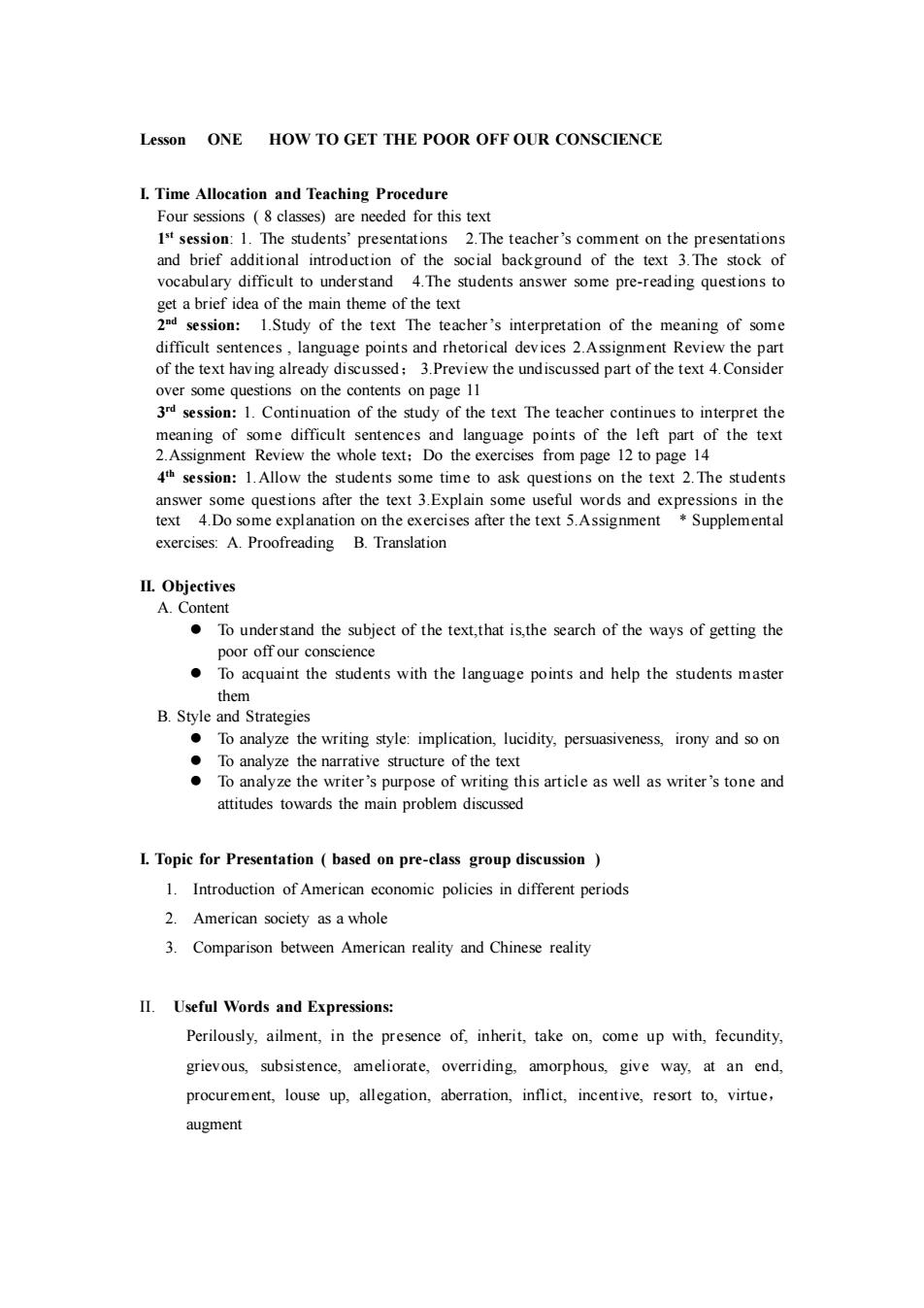
Lesson ONE HOW TO GET THE POOR OFF OUR CONSCIENCE i Time allocation and teaching procedure eded for this tex 1session:1.The students 2.The teacher's comment on the p and h additional in backgrou vocabulary difficult to understand 4.The students an some e-reading questions to e of te min of wme difficult sentences,language points and rhetorical devices 2.Assignment Review the part of the text having already discussed:3.Preview the undiscussed part of the text 4.Consider over some questions on the contents on page 11 3 session:1 Continuation of the study of the text The teacher continues to interpret the meaning of some difficult sentences and language points of the left part of the text 2.Assignment Review the whole text:Do the exercises from page 12 to page 14 4th session:1.Allow the students some time to ask questions on the text 2.The students answer some questions after the text 3.Explain some useful words and expressions in the text 4.Do some explanation on the exercises after the text 5.Assignment Supplemental exercises:A.Proofreading B.Translation L Objectives Tounderstand the subject of the text,that is,the search of the ways of getting the our conscience acquaint the students with the language points and help the students master B.Style the writing stye:implication lucidity,persuasiveness irony and so on ·anal e structure of the tex yze the this article as well as writer's tone and rds the LTopic for Presentation(based on pre-class group discussion 1.Introduction of American economic policies in different periods 2.American society as a whole 3.Comparison between American reality and Chinese reality II.Useful Words and Expressions: Perilously,ailment,in the presence of,inherit take n,come up with,fecundity grievous,subsistence,ameliorate,overriding.amorphous,give way,at an end. procurement,louse up,allegation,aberration,inflict,incentive,resort to virtue, augment
Lesson ONE HOW TO GET THE POOR OFF OUR CONSCIENCE I. Time Allocation and Teaching Procedure Four sessions ( 8 classes) are needed for this text 1 st session: 1. The students’ presentations 2.The teacher’s comment on the presentations and brief additional introduction of the social background of the text 3.The stock of vocabulary difficult to understand 4.The students answer some pre-reading questions to get a brief idea of the main theme of the text 2 nd session: 1.Study of the text The teacher’s interpretation of the meaning of some difficult sentences , language points and rhetorical devices 2.Assignment Review the part of the text having already discussed; 3.Preview the undiscussed part of the text 4.Consider over some questions on the contents on page 11 3 rd session: 1. Continuation of the study of the text The teacher continues to interpret the meaning of some difficult sentences and language points of the left part of the text 2.Assignment Review the whole text;Do the exercises from page 12 to page 14 4 th session: 1.Allow the students some time to ask questions on the text 2.The students answer some questions after the text 3.Explain some useful words and expressions in the text 4.Do some explanation on the exercises after the text 5.Assignment * Supplemental exercises: A. Proofreading B. Translation II. Objectives A. Content ⚫ To understand the subject of the text,that is,the search of the ways of getting the poor off our conscience ⚫ To acquaint the students with the language points and help the students master them B. Style and Strategies ⚫ To analyze the writing style: implication, lucidity, persuasiveness, irony and so on ⚫ To analyze the narrative structure of the text ⚫ To analyze the writer’s purpose of writing this article as well as writer’s tone and attitudes towards the main problem discussed I. Topic for Presentation ( based on pre-class group discussion ) 1. Introduction of American economic policies in different periods 2. American society as a whole 3. Comparison between American reality and Chinese reality II. Useful Words and Expressions: Perilously, ailment, in the presence of, inherit, take on, come up with, fecundity, grievous, subsistence, ameliorate, overriding, amorphous, give way, at an end, procurement, louse up, allegation, aberration, inflict, incentive, resort to, virtue, augment